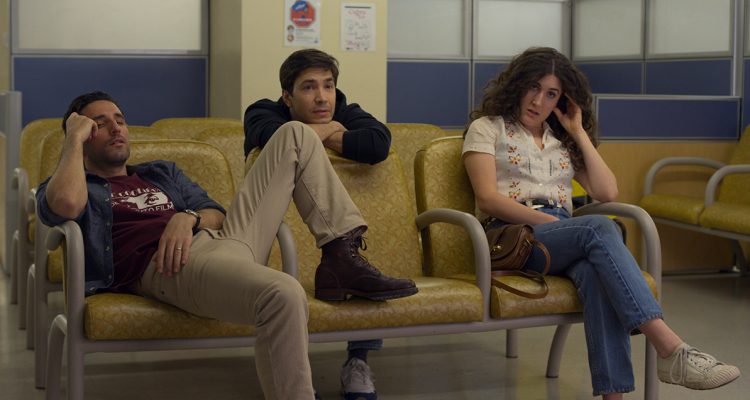Justin Long always looks confused. His characters rarely understand or grasp the significance of their actions and the pending consequences. From playing a student creating in his own college in “Accepted” to portraying a misogynistic coworker Off-Broadway in “Do You Feel Anger,” Long acts best when he’s misguided and unsure. In director Daniel Schechter’s new film “After Class,” Long’s character Josh works best when you don’t know his decision-making process or his thoughts on a certain subject. He burns with a passion and excitement for teaching, a wishy-washy resentment for his own family members, and a love for his hospitalized grandma that you see from the beginning. He is imperfect, at-fault more often than not. And as all of us, he loves bagels.
Josh teaches scriptwriting at an unnamed university in New York, becoming embroiled in a scandal involving an assault survivor in his class and the power surrounding professorial authority after he sparks a lively, yet forced discussion involving another student’s sexual experiences. A new teacher with his never-wiped-off babyface, Josh struggles to recognize this authority, this weight, and his subsequent need to apologize.
Schechter’s film treads on a topic filling the university sphere this decade: sexual assault on college campuses and the responsibility to be aware of students’ past experiences. Documentaries like “The Hunting Ground” show how expansive these assaults have become, while “After Class” wages war with itself on how professors and those in positions of power should deal with these issues. Schechter searches for answers throughout the film through the eyes of Josh, who struggles to face his own mistakes and privilege.
Though half of the film focuses on Josh’s worsening situation with his class, the other half rests on Josh’s family coming together in the wake of his grandmother’s (the fantastic Lynn Cohen) admittance to the hospital and sudden decline in health. Children of divorce, Josh and his brother (Michael Godere) and sister (Kate Berlant) navigate a tense family full of fighting, secrets, and unstable relationships. The family knows one another well, and the disagreements often end with statements that cut deeper than surface-level remarks. Schechter’s ability to use both seasoned and unseen actors should be mentioned as well, as the performances resonate due to their relatability.
“After Class” deals with these themes of assault, family, and also maturity. Josh himself embodies a man-child, someone with no sense of how his decisions create conflict and pain for others. He sleeps with his brother’s nanny, gets angry quite often, lives in a bubble of his own opinions, and has the constant problem of an inability to apologize for anything.
Long deserves recognition for playing this part to near perfection. He makes mistake after mistake, yet still ends up being likable. You want him to succeed, you want him to keep his job, and you want him to just say that he’s sorry. Once he finally does, you have faith that he’s grown up, changing into a person with more recognition of how he impacts the world.
Schecter’s film teeters and fascinates in grey areas, addressing white privilege, white guilt, and even jabs at the lack of diversity within university departments. In these grey areas, the film realizes its most interesting potential, as you watch Josh feel victimized by a sexual assault survivor, only understanding his ridiculousness once two white, male students approach him about their need for unnecessary validation. Long’s confusion during the entire mess simply works, partly due to how he looks, but mostly due to how he acts.
“After Class” does, at points, become bogged down by the family drama. It muddles too much in Long’s lack of guilt and pulls him right to the edge of being just another misogynistic and inconsiderate white man in a position of power. More eyes on the script would not have hurt some of the wording surrounding sexual assault as well. The film rushes to a somewhat redemptive conclusion, after wading through a plethora of problems for the first 90 minutes.
Schechter’s ideas remain strong through all of the confusion, and Long’s performance stands out due to its subtlety. The bittersweet nature of his character pushes you to examine how you would act in this situation, and how you might need to apologize to a few people once the credits roll. A movie with more ideas than answers, “After Class” deserves your attention, analysis, and shared experiences. [B]

